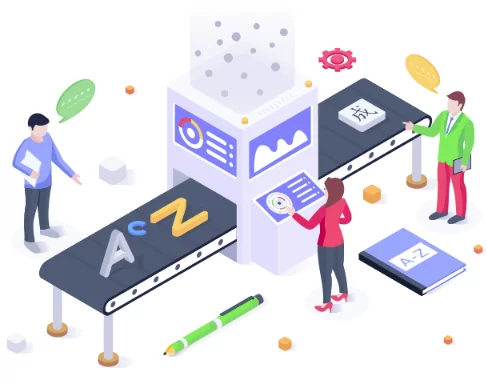AI, or artificial intelligence, is a widely misunderstood technology. The fact is that artificial intelligence (AI) is all around us now in the shape of machines that do routine activities. AI is founded on the assumption that human intellect can be defined and imitated by machines. AI has been present since 1956, but the most recent genuine advancements in big data, machine learning, and advanced analytics occurred in 2015.
Algorithms are now all around us, from self-driving cars and customized advertisements to fraud detection at the airport. Education is one of the areas where AI is being successfully implemented in a big way. While no algorithm or machine can replace the role of a human instructor, AI can make the knowledge acquisition and some parts of teaching easier and more customized.
Language study is of special importance since comprehending and communicating in multiple languages opens up prospects for personal and professional advancement.
AI Language Learning Aids in the Formation of a Foundation
Any foreign language student understands that the first stage in learning a new language is to master the fundamentals, which include the phonetic symbols or writing system, punctuation, and vocabulary. However, each learner and learners with various original languages will face unique problems in learning a second (or third!) language. Learners benefit from AI language tools because they provide tailored feedback and learn about their strengths and limitations.
Because AI learns by interaction, there are now applications or AI tools that identify what terms you don’t know and what ones you do and adjust the sort of instruction they provide you accordingly. Young language learners can therefore lay a strong basis for more sophisticated communication abilities.
Furthermore, AI tools allow students to learn at their own speed. Students can practice anything they wish and are not compelled to progress on before they are prepared, nor are they forced to study what they have already mastered. AI tools for language learning open up a whole new range of content and real-world applications.
Language learning using artificial intelligence

Algorithms based on artificial intelligence have the technology to enhance eLearning in all fields. Large organizations can utilize language learning solutions to improve the knowledge of their personnel. Individual students may utilize AI language learning to study whenever and wherever they choose.
Traditional schools can combine artificial intelligence language instruction to broaden students’ options. The benefits of using artificial intelligence in eLearning are remarkable. Here are a few of the advantages of machine learning in schooling. AI-enabled dictionary definitions and machine translation, for example, can provide context and assist students in learning foreign languages more conveniently than ever before.
Translation by machine

Artificial intelligence technologies such as neural machine translation have enabled machine translation to make significant progress. Along with better translation quality, neural machine translation can aid in the incorporation of machine translation into foreign language acquisition.
Machine Translation as a Bad Model is an educational approach in which students detect and rectify inconsistencies and flaws in machine-translated material. This improves students’ comprehension, phrase composition, and diction in the target language, as well as their understanding of a language and its peculiarities.
Bots for language translation

Chatbots have progressed from often useless dummy variables to intelligent assistants that can fool you into thinking you’re speaking with a real person. People have begun to use chatbots to learn foreign languages as they become smarter. All you have to do is participate in a conversation with an AI bot and learn via dialogue.
AI-powered language learning bots respond to your messages with personalized responses and may even evaluate your performance or advise you on how to improve. And the greatest thing is… You don’t have to deal with the failure anxiety that you would if you were talking to a real person.
Customized textbooks

Expecting everyone to study the very same textbook and be incredibly good is unrealistic since people learn in various ways and at different paces. That is why customized textbooks are so appealing. When a language learning system recognizes your progress and adjusts to your needs based on your specific data, it may present you with the necessary learning resources.
Textbook customization can be beneficial to instructors as well. If teachers could upload their educational plans into an AI system, the system might develop textbooks tailored to a given school, course, or even group of pupils.
Involvement in the learning process at a deeper level
Learners will be able to study from anywhere in the globe at their own speed, establish their own objectives, and follow a personalized curriculum thanks to AI utilized for language acquisition. Because of a tailored method of learning that differs from student to student, teachers will not have to go over the same content year after year. Furthermore, AI will aid in the development of entertaining games, questionnaires, and other learning and exploration activities that integrate academic programs with students’ interests.
Globalizing education

Students may now learn anywhere, at any time, thanks to artificial intelligence. This implies that if a student is absent from school due to personal or medical reasons, they may simply catch up on their schoolwork using artificial education software. Kids may also learn from anywhere in the globe, making better quality education more accessible and inexpensive for rural students and those from low-income families.
With the assistance of AI, children may learn more at home and arrive in the classroom with a set of fundamental abilities on which instructors can then expand. Artificial education is leveling the educational playing field for kids all around the world and providing equal opportunity to those who do not have access to an excellent education.
Conclusion
While artificial intelligence and education may appear to be futuristic inventions, they are already prevalent in our lives and educational institutions. We can make both students’ and instructors’ lives simpler with the aid of artificial education. Artificial education ensures that every student receives a high-quality education and personalized learning






